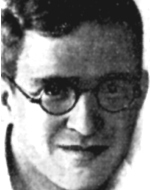Elchanan (Rabinowitz), Binyamin (Rabbi)
Son of Shulamit and Yitzhak-Elchanan, was born on August 30, 1926, in Berlin, the capital of Germany, and his parents returned to Kovno, Lithuania, to which the family was connected by generations. Rabbi Yitzchak-Elchanan Spektor was a member of a youth movement and activist for the Jewish National Fund in 1938. In 1938 he visited his father in Eretz Israel, and in Nissan TZ came up here with his older brother. His parents and younger brother remained abroad. He continued his studies at the Balfour Gymnasium in Tel Aviv in the fifth grade and immediately took his place among the students as a “sabra” for everything. At that time, the nickname “Rabbi” (abbreviated as his last name: Rabinowitz) was attached to him. He was a regular member of the class committee, on the basketball team of the gymnasium and one of the heads of the participants in the humorous newspapers written for the class. Benjamin excelled in all Hebrew subjects, mathematics and physics. About a year after his arrival in Israel he joined the Haganah. He completed courses for Hagam commanders, youth commanders, squadrons, scouts and sports instructors, and taught at his school in Hagam and Gadna and in the courses of these two. After graduating from high school, he wanted to volunteer for the British Army, the Jewish Brigade, but was not accepted for his poor vision. In 1945, his parents and brother, Holocaust survivors in Europe, immigrated to Israel and began studying mechanics. He served as a permanent member of the Haganah and was in charge of training the Hagam at the Bialik Gymnasium and the commander of the Gadna unit, and at the head of the Gadna unit he took part in the conquest of the city of Biya on the 11th of Adar 5706. Studies in the exact sciences did not satisfy him, and in the autumn of 1946 he began studying history and economics at the university in Jerusalem. He was also a commander and instructor in the Gadna and founded a battalion commanders’ training course for suburban youth, who continued to work in the Hagana and devoted himself to guiding suburban youth. Jerusalem to Massada. A month later he went back to Masada to travel with four fellow students. Separated from them to ask for water and remained for two days in the Judean Desert. Found his way alone and met with a group of searchers on the road leading from Ras Zuira to the west. On his experiences in the desert, he published his list “Kol Bamidbar Bamidbar” in Davar Hashavua (No. In the summer of 1947 he completed another course in Gadna. In December 1947, with the outbreak of the War of Independence, he was appointed acting commander of the isolated and isolated neighborhood of Kor-Haim. In the winter of 1948 he was sent to a course of liaison officers and returned to Jerusalem where he served in the field survey department of the entire Jerusalem area, first as deputy commander of the unit and later as commander. When he gradually completed the procedure with people and equipment, he had the task of planning and organizing the operations, and was forbidden to leave his place, depriving himself of any pleasure and advantage of a commander. No vacation permits to go out into the city took more than he gave his subordinates, and when he left he took an island “The conscience is the force in which man decides between two internal forces that clash with one another,” the commander of the army, Binyamin son of-Eliezer, – he would tell his friends, send others to my workDangerous dumes weighed on him, though he saw it as necessary, as he wrote in rhymes in May 1948: “I am the man I ordered to go / I sent him to die – and I was judged – I did it and my conscience is clean.” At the end of the first truce, his demand to transfer him to a combat unit was finally fulfilled. He was transferred as an infantry officer to the naval landing force, which began at that time, and on July 17-18, Operation “Death to the Intruder” was carried out, in an attempt to break through the Negev and to attack the village of Beit Afa From the north, when a “Givati” company was attacked from the south, the landing company clung to the outskirts of the village, but the attack from the south failed, and the Egyptians concentrated their efforts on the company that had clung to the village, After his death he was promoted to the rank of First Lieutenant (lieutenant) On the 9th of Tishrei 5710 (October 9, 1949) he was transferred to eternal rest in a grave in the Nahalat Yitzhak Military Cemetery His subordinates and friends who fell together with him.
